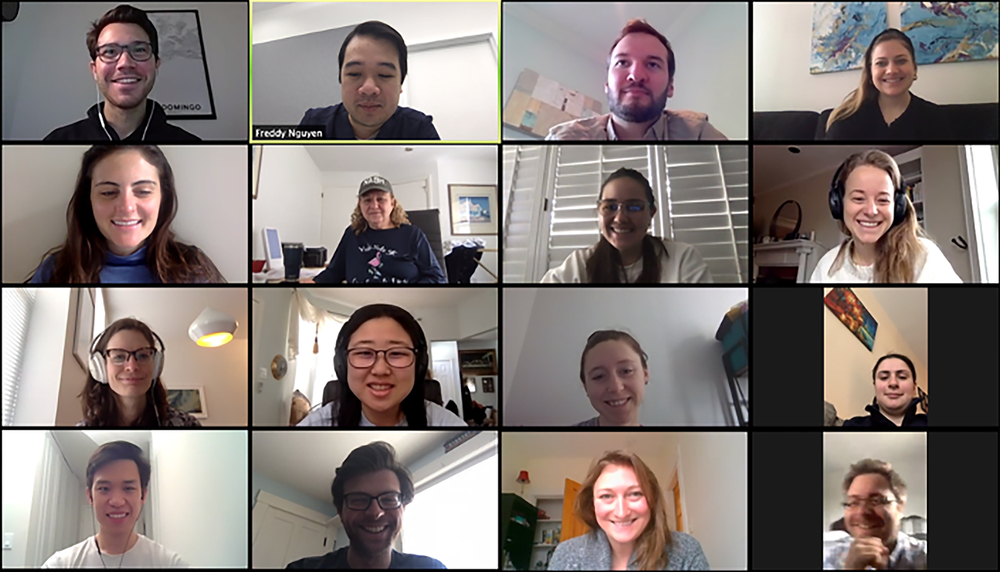Hundreds of Teams Converge Online for MIT Covid-19 Challenge Hackathons
-
-
Slice of MIT
Filed Under
On Saturday, September 26, Freddy Nguyen will speak at the MIT Virtual Alumni Leadership Conference about his experience co-organizing the MIT Covid-19 Challenge. Reserve your spot at alc.mit.edu to attend that session and others still to come during the free, weeklong virtual event, which kicked off on Monday, September 21.
It was early March 2020. The US and the world were bracing for the outbreak of a dangerous viral pandemic. Most members of the MIT community had left the campus and returned to their homes—many of them to homes abroad. For Alfonso Martinez MBA ’20 and Freddy T. Nguyen, the Arnold O. Beckman Postdoctoral Fellow at MIT’s Institute for Medical Engineering and Science and a pathology resident at Mount Sinai Hospital, there was only one logical response: a hackathon.
“We had an impending pandemic that was going to create myriad problems across the globe,” says Nguyen, a co-organizer, along with Martinez, of the MIT Covid-19 Challenge. Since March, the MIT community-led initiative has staged seven hackathons addressing the pandemic. “We needed to define the problems facing us and create a structure that could produce solutions quickly. At the same time, we had hundreds of our people with mad skills confined to their homes with nowhere to apply those skills. From our perspective, a hackathon was a no-brainer.”
Martinez and Nguyen first met at the 2018 MIT Hacking Medicine Grand Hack—the annual MIT health care hackathon where Nguyen served as co-director, and where Martinez conceived auggi, the consumer health startup he would develop during his time at Sloan. On March 21, the pair virtually convened 200 MIT collaborators for a Covid-19 IDEAthon, through which they drafted a preliminary list of priorities to help face the most immediate challenges of the global pandemic.
The event was more than proof of concept; it was proof of need. A series of virtual hackathons followed, all in rapid succession, and with rapidly swelling ranks. Roughly 1,800 people from 49 US states and 96 countries convened online April 3–5 for Beat the Pandemic. More than 200 multidisciplinary teams presented to a panel of judges their proposals for ways to protect the US health care system from being overwhelmed by Covid-19.

Participants soon realized that a global pandemic presents different challenges in different regions of the globe. “The problem may be the same, but the local ecosystem redefines the way we need to respond,” says Nguyen. “In the US the person prescribing treatment isn’t the person paying for treatment. In other regions they might be. There are problems of electricity, access to testing, and misinformation that vary from place to place.”
In early May, the MIT Covid-19 Challenge staged Africa Takes On Covid-19, in which teams presented potential solutions to the challenges the pandemic posed in Africa. A second Beat the Pandemic hackathon in late May focused on ways to facilitate the reopening of the global economy and to prevent or respond to an eventual second wave of the pandemic. This summer, the MIT Covid-19 Challenge staged events to brainstorm ways to mitigate and manage the impact of the virus in Latin America and India.
“All of the successive events came out of Beat the Pandemic,” says Martinez, who organized hackathons in the health care industry before coming to Sloan in 2018. “And they came out spontaneously. One of the winning teams from the first Beat the Pandemic approached us to propose a hackathon on Covid-19 and Africa. The same for the Latin America and India events. It was a community-led effort involving partners like the Martin Trust Center, MIT International Science and Technology Initiatives (MISTI), the MIT Innovation Initiative, and MIT Hacking Medicine. Each event was powered by 25 to 40 volunteers: undergrads, graduate students, postdocs, staff, professionals from other schools, and MIT alumni.”
It was a community-led effort... Each event was powered by 25 to 40 volunteers: undergrads, graduate students, postdocs, staff, professionals from other schools, and MIT alumni.
Each of the events produced concrete solutions to vexing problems. Often, those solutions saw existing technologies and methods repurposed to respond to the pandemic. A team at the Africa event began work on a portable device that could sterilize N95 masks for reuse. A second team explored using CRISPR technology to develop more-sensitive Covid-19 tests. One winning hackathon team addressed the scarcity of Covid-19 testing materials by leveraging artificial intelligence to develop a model for pool testing. That team went on to found wePool AI, an early-stage startup in Cambridge. Other teams are working with academic and industry partners they met through the MIT Covid-19 Challenge. And a new hackathon devoted to the future of work, tentatively scheduled for November, is now in the planning stages.
“A proper hackathon brings all the stakeholders together, across disciplines, industries, and institutions,” says Nguyen. “It saves everyone a lot of time and accelerates the development process. I’m not sure if we’re promoting organized chaos or a process of random collisions. But we try to create an environment where both can and do occur.”
Graphic at top: a depiction of the network of individuals and partner organizations involved in April's Beat the Pandemic hackathon. All images courtesy of the MIT Covid-19 Challenge.









